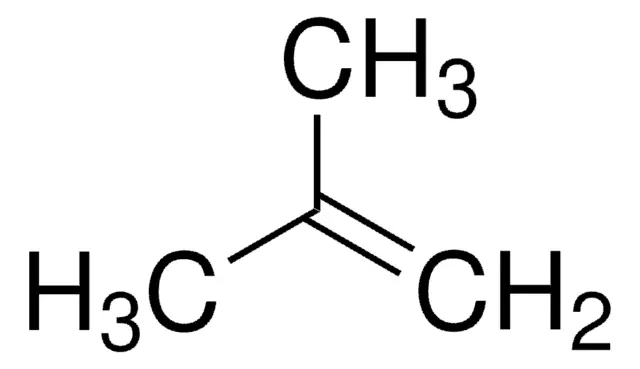ISOBUTYLENE (IB)/ISOBUTENE/2 METHYLPROPENE, CAS 115-11-7
Physical and Chemical Properties of Isobutene:
| IUPAC Name: | 2-methylprop-1-ene |
| Molecular Formula: | C4H8 |
| Form: | Gas |
| Colour: | Colourless |
| Odour: | Petroleum-like |
| CAS Number: | 115-11-7 |
| Molar Weight: | 56.11 |
| Melting Point: | −140.3 °C |
| Boiling Point: | −6.9 °C |
| Density: | 0.5879 g/cm3, liquid |
| Vapor Density: | 1.94 (Air=1) |
| Flammability: | Flammable |
Solubility of Isobutylene
Insoluble in water, very soluble in ethanol and ether and soluble in benzene
Synonyms of Isobutylene
2-Methylpropene, Isobutene, γ-Butylene, 2-Methylpropylene, Methylpropene
How is 2 Methypropene manufactured?
Isobutylene aka 2 methylpropene or Isobutene is generally produced by dehydrating tertiary butyl alcohol (TBA) or catalytic dehydrogenation of isobutane. The gasoline additives methyl tertiary butyl ether (MTBE) and ethyl tertiary butyl ether (ETBE) are synthesised by reacting methanol or ethanol with isobutylene contained in butene streams from olefin stream refineries or with isobutylene from dehydrated TBA.
Another method of manufacturing isobutylene/isobutene is by back-cracking MTBE or ETBE at high temperatures and then separating the isobutylene by distillation from methanol (methyl alcohol) or ethanol.
Industry Applications of Isobutene
- Isobutylene/2 methylpropene is widely used for the production of various compounds. It is used to produce isooctane, a high octane aviation gasoline.
- It is also used to synthesise butyl rubber, trimers and other polymers.
- Isobutylene is a key component for the production of antioxidants such as butylated hydroxytoluene (BHT), 4-methoxyphenol and therefore useful in foods, supplements, packaging and plastics.
- It also has wide applications in perfume, fragrance and lubricant domains.
Summary
Vinati Organics Pvt. Ltd. is one of the biggest isobutylene/2 methylpropene/isobutene manufacturers. With 2 state-of-the-art manufacturing facilities in India, we ensure the highest quality and purity of isobutylene for our clients. We follow the international standards to manufacture our speciality chemicals and organic intermediates. With constant innovation, we supply isobutylene to 35+ countries across the US, Europe and Asia. Vinati Organics employs green manufacturing practices to create environment-friendly products and we strive to keep the impact on climate minimum.
FAQs
Isobutene, also known as 2-methylpropene, is a hydrocarbon that belongs to the alkene family. It is a colorless gas at room temperature with a faint petroleum-like odor. Isobutene is an important chemical used as a building block in the petrochemical industry. It has the formula C4H8 and features a double bond between the second and third carbon atoms in its structure. This compound is highly reactive, making it a crucial intermediate in the production of various chemicals, including butyl rubber, gasoline components, and other valuable derivatives.
Yes, isobutene and isobutylene refer to the same chemical compound. Both names are used interchangeably to describe the same molecule with the formula C4H8, which is an unsaturated hydrocarbon. The term “isobutene” is more commonly used in the context of its applications and industrial usage, while “isobutylene” is often found in chemical nomenclature. Regardless of the name used, they both describe 2-methylpropene, a key intermediate in the production of various chemical products.
The chemical formula of isobutene (isobutylene) is C4H8. This indicates that each molecule of isobutene contains four carbon atoms and eight hydrogen atoms. The structure of isobutene includes a double bond between two of the carbon atoms, specifically between the second and third carbons in the chain. This double bond classifies isobutene as an alkene and gives it its reactive properties, which are exploited in various chemical synthesis and industrial processes.
Isobutene is utilized in a wide range of industrial applications. One of its primary uses is producing butyl rubber, employed in making tires, sealants, and various rubber products due to its excellent impermeability to gases. Isobutene is also used to produce MTBE (methyl tert-butyl ether), an additive that increases the octane rating of gasoline, improving combustion efficiency and reducing engine knocking. Additionally, isobutene serves as a precursor in the manufacture of various chemicals and polymers, including plastics and resins.
Yes, isobutene is highly flammable. It is a volatile gas that can form explosive mixtures with air at concentrations between 1.8% and 8.4%. Due to its flammability, it requires careful handling and storage to prevent accidental ignition. Isobutene can easily catch fire from sparks, flames, or static discharge. Therefore, industries that use or produce isobutylene implement strict safety measures, including proper ventilation, grounding of equipment, and the use of explosion-proof electrical devices, to minimize the risk of fire or explosion.
Vinati Organics Limited is a prominent manufacturer of isobutene in India. Established in 1989, Vinati Organics has grown to become a global leader in specialty chemical and organic intermediates. The company is renowned for its high-quality products, cutting-edge technology, and sustainable practices. Isobutene, a critical component used in various applications such as fuel additives, rubber manufacturing, and plastics, is one of their key offerings. Vinati Organics’ commitment to innovation and excellence has positioned them as a trusted name in the chemical industry, both in India and internationally. Their dedication to environmental sustainability and customer satisfaction underscores their reputation as a leading manufacturer in this sector.

